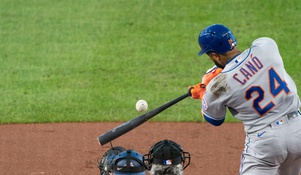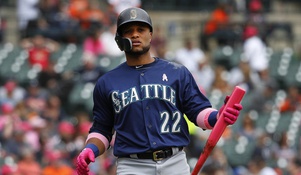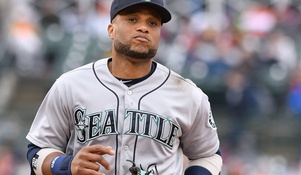MLB Dream Team: Active Players bound for the Hall of Fame Part II
By Connor Pignatello
In a continuation of my article from yesterday, here is part two of the MLB Dream Team. This article will showcase spots six through nine in the batting order as well as the starting pitcher.
Enjoy!
Batting sixth and playing second base…
64.4 career WAR / 50.3 7yr-peak WAR / 57.4 JAWS
Average HOF 2B:
69.4 career WAR / 44.5 7yr-peak WAR / 56.9 JAWS
9th in JAWS out of 20 Hall of Fame Second basemen
Accolades: 8x All-Star, 2x Gold Glove, 5x Silver Slugger, World Series Champion (2009)
For many years, has been in the conversation as the best second baseman in baseball.
He was an integral part of the New York Yankees 2009 championship squad, and he parlayed his five All-Star appearances with the Bronx Bombers into a 10 year, $240 million contract with the Mariners in 2014. Cano hasn’t lost his luster since leaving New York for Seattle, and he has made three All-Star games (so far) with the Mariners.
Cano had to beat out and -- two likely Hall of Famers in their own right -- to earn his position at the keystone sack in this lineup. Ultimately, Cano received the nod because of his sustained excellence. He has played at least 156 games every year since 2007, a level of health that neither Pedroia nor Utley can match.
Cano has also redefined the second base position because of his ability to hit for average and power. Among Hall of Fame second basemen, Cano’s average of 25 home runs per season ranks second and his 296 career home runs ranks third. In a few years Cano should hold the record for career long balls by a second baseman, and he should be known as the greatest power hitting second baseman of all time.
Batting seventh and playing center field…
70.3 career WAR / 44.3 7yr-peak WAR / 57.3 JAWS
Average HOF CF:
71.2 career WAR / 44.6 7yr-peak WAR / 57.9 JAWS
8th in JAWS out of 19 Hall of Fame Center Fielders
Accolades: Rookie of the Year (1999), 9x All-Star, 3x Gold Glove, 2x Silver Slugger
, always a reliable asset, is now in his 20th season. Beltran has been every archetype an athlete can be: young star (Royals); decisive deadline acquisition (Astros); hero (Mets); scapegoat (Mets again); veteran contributor (Giants, Cardinals, Yankees, Rangers); and experienced old-timer (Astros again). Beltran was the fifth-youngest in the majors when he debuted in 1998, and now he’s the third-oldest player in the league.
Beltran came into the majors as a 21 year old kid for the Kansas City Royals, and immediately showcased his skills by taking home Rookie of the Year honors.
After seven years in Kansas City, Beltran signed with the New York Mets in 2005. It was in New York that Beltran would spend the prime of his career, making five All-Star appearances and taking home 3 Gold Gloves. Beltran proved to be one of the best players in the Major Leagues from 2006 to 2008, crushing 37 homers, driving in 124 runs, and scoring 123 (per 162 games).
Beltran has aged well, making All-Star teams as members of the Giants, Cardinals, and Yankees since leaving the Mets in 2011. However, the 40 year old has shown signs of decline this year, and he may decide to hang up his spikes in the near future. Beltran left a lasting impression on the game of baseball, and his 20 years of service deserve a place in Cooperstown.
Batting eighth and catching…
51.4 career WAR / 38.5 7yr-peak WAR / 45.0 JAWS
Average HOF C:
53.4 career WAR / 34.4 7yr-peak WAR / 43.9 JAWS
8th in JAWS out of 15 Hall of Fame Catchers
Accolades: MVP (2009), 6x All-Star, 3x Gold Glove, 5x Silver Slugger
Even though has not caught a game since 2013, he spent 10 seasons and 920 games behind the dish.
Mauer was truly one of the finest offensive backstops ever, and in 2009 he became only the second catcher since 1980 to win MVP ( was the first in 1999). In Mauer’s MVP season, he led the majors in batting average (.365) and on-base percentage (.444), both of which were records for catchers. He also led the AL in slugging (.587), OPS (1.031) and Offensive WAR (7.6). In addition to his MVP, Mauer was the first AL catcher to win the batting title and he holds the record for most batting titles by a catcher with three.
As well as being one of the league’s finest hitters, Mauer was a force to be reckoned with behind the plate. His great instincts and fielding prowess earned him three straight Gold Gloves from 2008 to 2010, and his 99.51% career fielding percentage ranks seventh all-time among catchers.
Although Mauer’s body has declined over the years, he has performed well since being moved to first base in 2014, and has not made an error this year in 69 games.
Mauer will leave a legacy as one of the greatest hitting catchers ever, and he has earned his place in the Hall of Fame.
Batting ninth at shortstop…
44.0 career WAR / 40.0 7yr-peak WAR / 42.0 JAWS
Average HOF SS:
66.7 career WAR / 42.8 7yr-peak WAR / 54.8 JAWS
26th in JAWS out of 21 Hall of Fame Shortstops
Accolades: 5x All-Star, 2x Gold Glove, 2x Silver Slugger
This is the hardest decision on the roster, because in my opinion there aren’t any Hall-of-Fame-worthy shortstops in the majors right now. and , the two best shortstops of this generation, have retired in the past two years.
I ended up choosing because he has the best chance of any shortstop in the majors to make it to the Hall.
There were a few ways I could have gone with this pick. At first I considered moving to short, and then I looked at the plethora of up-and-coming shortstops (, , ; to name a few).
Ultimately, I chose Tulowitzki -- but this would have been a much easier decision if Tulo had stayed healthy during his career. During his prime years with the Rockies between 2007 and 2014, Tulowitzki averaged a respectable 4.8 WAR per season. However, he missed an average of 45 games per year (!) during that period. If you extrapolate his numbers to 154 games (meaning he would miss 8 games per year), he would have recorded 6.7 WAR per season, boosting his JAWS from 42.0 to 50.0.
Although Tulowitzki didn’t stay healthy most of the time, his impact while he was on the field was undoubted, and he deserves Hall of Fame consideration.
And your starting pitcher for tonight...
58.8 career WAR / 48.7 7yr-peak WAR / 53.8 JAWS
Average HOF P:
73.9 career WAR / 50.3 7yr-peak WAR / 62.1 JAWS
60th in JAWS out of 62 Hall of Fame Pitchers
Accolades: Pitching Triple Crown (2011), MVP (2014), 3x (2011, 2013, 2014), 7x All-Star, 1x Gold Glove
, in my opinion, is the best pitcher in the game right now. He has been terrorizing opposing hitters since coming up as a 20 year old with the Dodgers in 2008.
Kershaw achieved the Pitching Triple Crown in 2011, when he led the league in ERA, wins, and strikeouts. In 2014, Kershaw joined and as just the third player in baseball history to win three awards and an MVP.
Kershaw has finished as an All-Star and a top-five award finisher in each of the past six seasons, a nearly unparalleled run of dominance, and he has already attained a career’s worth of honors at just 29 years old.
Supposing Kershaw retires at age 37, he has eight years remaining in his career. If we extrapolate his season average of 5.7 WAR to seven more years, then his current WAR of 57.0 jumps to 102.6, which places him as the ninth best pitcher of all time, a very fair assessment.
Kershaw has the lowest career ERA of any starter since 1920* (2.35), and he deserves a plaque in Cooperstown.
*Baseball-Reference defines a starting pitcher as a player whose starts make up 60% of their appearances. Minimum of 50 Innings Pitched.
Special thanks to for all of these helpful stats. I could not have written this article without them.



